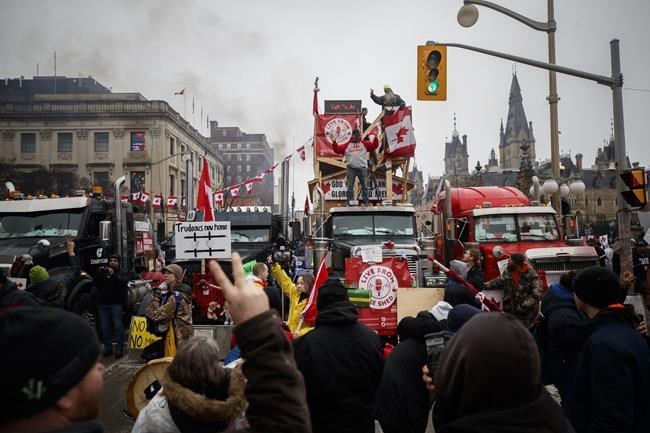
Protesters and supporters gather to listen to speakers in downtown Ottawa as a protest against COVID-19 measures that has grown into a broader anti-government protest continues to occupy Ottawa, Thursday, Feb. 17, 2022. The "Freedom Convoy" protest was chosen as The Canadian Press Newsmaker of the Year. THE CANADIAN PRESS/Cole Burston
Republished December 20, 2022 - 2:07 PM
Original Publication Date December 20, 2022 - 7:06 AM
OTTAWA - They came to Ottawa by the thousands with different goals and grievances, but united in their disenfranchisement with the federal Liberal government and COVID-19 health restrictions.
The protesters who formed the self-titled "Freedom Convoy" and similar demonstrations across the country blockaded the streets of the capital and international border crossings, marking a new form of protest in Ottawa.
The group that Prime Minister Justin Trudeau described as a "fringe minority" has been voted The Canadian Press Newsmaker of the Year by editors in newsrooms all over Canada.
The decades-old annual tradition at The Canadian Press is meant to reflect the person or group of people that had the biggest influence on the Canadian news cycle that year.
The convoy gathered momentum quickly in early 2022, raising support and donations from across the country.
"As the 'Freedom Convoy' began rolling east and crowdfunding support soared into the millions, it became clear these protesters would have both bark and bite," Dawn Walton, managing editor of CTV Calgary, wrote in her survey response.
One of the organizers, Tamara Lich, told a small gathering of reporters during the first week of the protest that demonstrators were there "out of love" for their families, communities and country.
The jovial, festival-like nature of the weeks-long demonstration was at odds with what Ottawa police and local politicians described as a lawless and dangerous occupation of the city.
Drivers in big-rig trucks honked their horns almost continuously at all hours of the day until a court order forced them to stop. The stench of diesel fumes and smoke hung in the air, and some Ottawa residents described feeling trapped in their homes, afraid to venture out into the unruly and unpredictable crowds.
Some of those who gathered in Ottawa described feeling hurt by two years of pandemic restrictions and said they wanted their concerns heard by the federal government.
"We had spent a long time feeling like we were really alone," Maggie Hope Braun, a protester from Peterborough, Ont., told a federal inquiry months later.
Others appeared angry with the prime minister and his government, as evidenced by hundreds of flags with expletives aimed at Trudeau.
Some called for an end to COVID-19 vaccine mandates, while others called for the overthrow of the elected government.
"The self-described 'Freedom Convoy' protesters may have been unclear on their goals and ill-informed as to how to pursue them, but they reflected a schism in our society that is ignored at our peril," wrote Murray Wood, program director at 980 CJME in Regina.
The protests became entrenched for so long that Trudeau resorted to declaring a public-order emergency on Feb. 14, invoking the Emergencies Act for the first time since it replaced the War Measures Act in 1988.
"Rarely has an act of protest been so dramatically acted upon by the highest levels of power in Canada," Walton wrote.
While protesters insist their blockades were peaceful and non-violent, police discovered a stockpile of weapons at the border blockade in the small town of Coutts, Alta., before that protest disbanded.
RCMP alleged the group was arming itself for a potential standoff with police.
"The 'Freedom Convoy' protests brought international attention to Canada and forced the country to grapple with an angry, conspiratorial populist wave," wrote Marco Vigliotti, city editor of the Ottawa Citizen and the Ottawa Sun.
As it became clear police were planning a large-scale operation to remove the protesters in Ottawa with the help of new extraordinary powers granted under the Emergencies Act, people continued to travel to the city to join in.
"I felt there was a great need for me to be there, not only as a veteran but as a seriously wounded veteran, to be there to protect the Canadian people from what could potentially happen," protester Chris Deering told the federal inquiry into the Emergencies Act this fall.
Hundreds of protesters were arrested when police launched a massive operation in downtown Ottawa.
Several organizers and protesters are expected to stand trial next year on a variety of charges.
"Love them or hate them, the convoy protesters impacted most Canadians' daily lives in 2022 and showed the fractures in our country," wrote Tim Switzer, managing editor of the Regina Leader-Post.
Forty-nine per cent of the 104 survey respondents voted for the protesters to be Newsmaker of the Year, ahead of 28 per cent for Queen Elizabeth II, who died in September.
On Monday, The Canadian Press revealed the "Freedom Convoy" protest itself had also been selected as the top news story of the year.
This report by The Canadian Press was first published Dec. 20, 2022.
News from © The Canadian Press, 2022